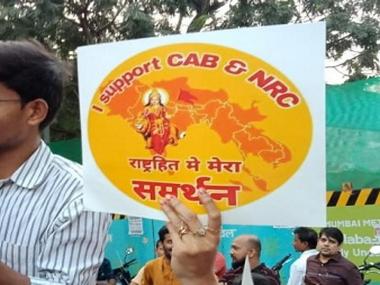New Delhi: In recent days, some states have expressed objections over the National Population Register (NPR) form having columns on date and place of birth of parents. However, speaking to Firstpost, a senior government official said that the controversy is unfounded as the aim is to collect quality data, and that disclosing this information is optional. The official recalled that during a pilot project of the NPR in Kathua many years ago, an enumerator had come across a family with 32 members, all of whom were of the same age group. [caption id=“attachment_7928361” align=“alignleft” width=“380”]  Banners at a march in support of the NRC and CAA in Mumbai. Firstpost/Neerja Deodhar[/caption] “This had created a suspicion and was flagged during a workshop. We realised that it is important to avoid such data. Most people know at least the place of birth of their parents, if not the date of birth. Sharing this information is optional, in case some people cannot remember the place of birth. This quality data can be used by central ministries and states for various welfare schemes, programmes and can save the taxpayers’ money,” the official said. During a workshop held on 17 and 18 January, this issue, along with 20 other questions, was discussed at length. During the workshop, officials were told that at least three exercises of updating the NPR were conducted in the past, and only seven more questions have been added to it to improve the quality of data to be collected by census officials. The official quoted earlier said, “State government officials present at the meeting agreed on most issues. However, some states are merely carrying out political actions.” Another official privy to the meeting said nine states and four Union Territories that have coastal areas had conducted the NPR process in 2011, when the UPA government had planned the National Register of Indian Citizen (NRIC). In March 2012, when Narendra Modi was the chief minister of Gujarat, the state government had told the Centre that the verification process of NPR in coastal villages was not foolproof, and had asked for proper vetting before distributing resident identity cards. The state was of the view that a robust methodology for verification of individuals must be carried out. Subsequently, the UPA government had covered 3,331 villages in Andhra Pradesh, Gujarat,Goa, Maharashtra, Karnataka, Kerala, Tamil Nadu, Odisha and West Bengal, and the Union Territories of Puducherry, Lakshadweep, Daman and Diu, Andaman and Nicobar Islands and had also started the distribution of smart cards with the help of the Department of Posts. Congress leader P Chidambaram, who is opposing the NPR, had, in fact, pushed for the completion of the NPR and NRIC, when he was the home minister in 2012. The official said, “There is a lot of misinformation that the NPR process is basically the NRC. It is not. Since the NPR in coastal areas was launched in the wake of the 2008 Mumbai terror attack, the entire process was vetted from a security perspective. In the proposed NPR, many questions are optional. In 2011, we had found that many people in Arunachal Pradesh who were living outside their native villages were not able to name the village they hailed from. Such data cannot be useful.”
In recent days, some states have expressed objections over the National Population Register form having columns on date and place of birth of parents.
Advertisement
End of Article


)

)
)
)
)
)
)
)
)



